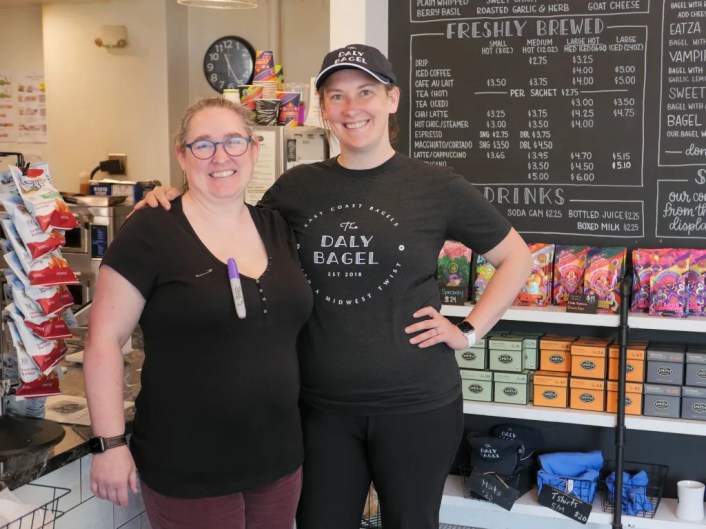Local restaurants across the Greater West Side – city and near west suburbs — have risen to the voluntary challenge of becoming Illinois’ first “green dining hub.” The program is supposed to roll out in earnest this summer, but so far, 12 restaurants and counting have committed to altering operations to become part of an environmentally sustainable restaurant eco-system.
One of those restaurants, the Daly Bagel, signed on to the initiative last October after hearing about it at a meeting of Takeout 25, an Oak Park-based non-profit that supports local restaurants and other food establishments started by the sustainability-minded Oak Park village trustee, Ravi Parakkat.
Since then, Daly Bagel co-owners Adrienne Guldin and Amanda Daly attest the greening process has been smooth, interesting and relatively easy at the bakery, 130 Chicago Ave. This was a pleasant surprise for the two, who initially felt a little overwhelmed at the prospect of what going green could entail.

“We’re already so strapped for time,” said Daly. “I was like, ‘Oh my gosh, what are we getting ourselves into?’ but I have to say it has been so painless.”
This, according to Daly and Guldin, is in large part because of Cassie Carroll, founder of the Illinois Green Business Association and program director of the Smart Energy Design Assistance Center at the University of Illinois Urbana-Champaign. The two organizations teamed up to create the Illinois Green Business Program, which provides technical assistance and cost-saving energy efficiency opportunities to businesses.
Carroll connected with Parakkat and Takeout 25 through staff at the Village of Oak Park. Village staffers had reached out to Carroll initially as part of its Climate Ready Oak Park climate change plan to explore what a green business program might look like for the village. From there, her collaboration with Parakkat was born, according to Carroll.
“We thought it would be a great opportunity to help restaurants, especially because they were some of the hardest hit during the pandemic, really connect to the energy and cost saving opportunities,” said Carroll. “But then bring sustainability practices to the broader community and ultimately provide greener dining experiences for those in the region.”
To do this, Carroll and her team assess the participating food businesses based on a set of standards, gauging their energy consumption and waste and recycling methods, among other areas. Based on how the businesses measure up against the standards, Carroll develops plans for improvement, tailored to each businesses’ needs and limitations. Essentially, Carroll does the heavy lifting.
For the Daly Bagel, that meant such suggestions as switching refrigerators to reduce yearly energy costs. Carroll, according to Guldin and Daly, even provided a list of recommended refrigerator models at different price points and where to buy them.
“She’s doing the consumer reporting and the stuff that we would really like to be able to have the time to do,” said Guldin.

Carroll and her team understand the individual limitations of businesses and help to find workarounds to offset the environmental and financial impacts associated with certain fixed variables. This includes the massive oven used at the Daly Bagel, which was built in the 1930s for baking bagels.
“Because of the nature of what we do, we can’t change this oven,” said Daly. “This is an oven that is specifically built for what we do, and they haven’t changed the design in nearly 100 years.”
The experience has been so positive for Daly Bagel, the co-owners have been encouraging their peers to sign on to the initiative, which was changed from being a green dining district to a hub, representative of the several municipalities Takeout 25 works within. Food businesses generally want to employ more sustainable practices, according to Daly, but owners often don’t have the know-how or the resources to implement them.
“Our time and our mental energy are already spread so thin, the thought of taking on something, that on the surface appears to be a lot of work, can be a deterrent,” said Daly.
Carroll is something of a green fairy godmother, stepping in and solving problems for food businesses, then returning annually to make sure things still run smoothly. And to help assist the businesses in making these investments, Takeout 25 is putting $25,000 toward the effort if 25 businesses commit.
“It’s not just talk; we are putting our money where our mouth is,” said Parakkat, who is in the process of mobilizing financial sponsors.
And it’s not too late to get involved. Beyond taking active steps to address climate change, the intent is to get as many food businesses on board as possible to make the Greater West Side a dining destination, attracting customers throughout the greater metropolitan area. Carroll and Parakkat are excited to help make that a reality.
“We look forward to helping more restaurants within the community really go green,” said Carroll.
12 food businesses committed to being a part of the green dining hub:
Autre Monde
Poke
Khyber Pass
Happy Apple
Daly Bagel
Kettlestrings Tavern
Brewpoint
Sugar Beet
Carnivore
Scratch on Lake
Brown Cow
Anfora Wine
Betty’s Pizza and Pasta







